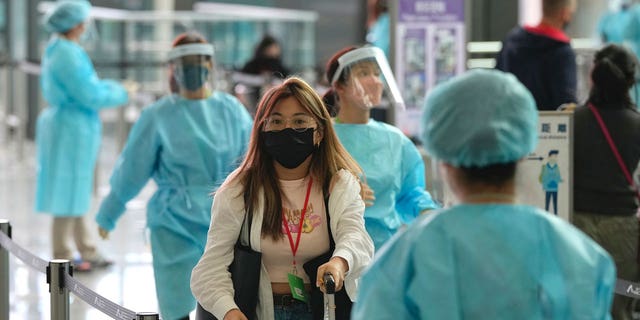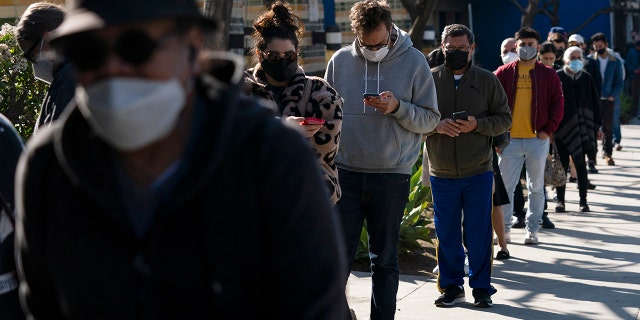Vaccinated patients with blood cancers are at higher risk of breakthrough COVID than other cancers, study says

health Eshrag:
NEWYou can now listen to Fox News articles!
COVID-19 vaccines protect most cancer patients from contracting COVID or severe cases, however; those with blood cancers do not get the same protective benefit, according to a research study at the Indiana University Melvin and Bren Simon Comprehensive Cancer Center in Indianapolis.
Vaccinated Patients with blood cancer may have a “higher and widely varied risk” of breakthrough infections of COVID, according to a published study in the Journal of Clinical Oncology.
“Patients with hematologic cancers, or blood cancers, including leukemia, multiple myeloma and lymphoma, were at a higher risk of breakthrough COVID,” and “those with blood cancers had a greater risk than solid cancers,” the researchers stated in a release sent to Fox News about the study.
FILE – A nurse checks on IV fluids while talking to a COVID-19 patient at Providence Holy Cross Medical Center in Los Angeles
(AP Photo/Jae C. Hong, File)
SPECIAL ULTRAVIOLET LIGHT PREVENTS INDOOR TRANSMISSION OF AIRBORNE PATHOGENS WITHOUT HARMING HUMANS: STUDY
Lead investigator of the study, Jing Su, PhD, who is an assistant professor in the Indiana University School of Medicine Department of Biostatistics led a team of researchers from 10 research institutes across the country to analyze data from the National COVID Cohort Collaborative (N3C) at the National Institutes of Health.
According to the release, the researchers found the risk of breakthrough infection was reduced after the second vaccine dose for all cancer type patients. The team also said in the report, “the Moderna vaccine was more effective than the Pfizer vaccine for protecting patients with hematologic cancers, especially patients with multiple myeloma.”

A worker in protective gear holds up a sign which reads “Do not crowd” as he directs a resident near a line for the first round of mass COVID testing in the Jingan district of western Shanghai, China, Friday, April 1, 2022. As residents of western Shanghai start a four-day lockdown for mass testing, some in eastern Shanghai about to end their lockdown are being told they will be confined to their homes for at least 10 more days. It was the latest wrinkle in the lockdown of China’s largest city as it struggles to eliminate an omicron-driven coronavirus outbreak under China’s zero-COVID policy.
(AP Photo/Chen Si)
The release said the team used one of the largest COVID real-world data resources in the world and the largest in the United States. Su, who is also the core associate director of real-world data for the cancer center’s Biostatistics and Data Management Core said the study included more than 12.5 million patients and 4.5 million COVID patients. The team examined more than 64,000 cancer patients who were vaccinated against COVID-19, according to the release.
“We systematically screened major cancer types and major treatment types, as well as other risk factors such as age, comorbidities, sex, race, geographic locations and others to qualitatively know the contribution of each risk factor and the specific rates of each cancer subgroup as well as the contribution of treatment categories for cancer patients,” Su said in the release. The researcher also explained that this type of analysis was only possible because the team had a huge COVID cohort and control cohort.

People wait in line for a COVID-19 test in Los Angeles, Jan. 4, 2022. Scientists are seeing signals that COVID-19′s alarming omicron wave may have peaked in Britain and is about to do the same in the U.S., at which point cases may start dropping off dramatically.
(AP Photo/Jae C. Hong, File)
The study release said the findings might help guide clinical care and treatment for cancer patients who have COVID and that beyond this pandemic, these findings could also help in the development of immune-based cancer treatments. The researchers explained that since immunotherapy treatment relies on the ability of the person’s immune system to fight the disease, these findings may help predict which patients would benefit from specific types of cancer treatments.
ARIZONA FAMILY PUSHES ‘RIGHT TO TRY 2.0’ AFTER BEING FORCED TO TRAVEL TO ITALY FOR MEDICAL TREATMENT
“In fact, the COVID pandemic provides a unique opportunity for us to screen the immune competence among all cancer patients at a national level,” Su said in the release. “We could use this to imitate the differential immune capacities among cancer patients. This could guide us to better understand whether cancer patients will have good responses to cancer vaccines and if they are at a higher risk of infection of other viruses, such as the flu.”
The group is now researching waning immunity and the effectiveness of booster shots, especially with the emergence of new variants of COVID, such as BA.2.
CLICK HERE TO GET THE FOX NEWS APP
“We are monitoring the situation to see what new variants will mean for cancer patients and how to best protect them through vaccination.”
Noting that the news was copied from another site and all rights reserved to the original source.
xnxx,
xvideos,
porn,
porn,
xnxx,
Phim sex,
mp3 download,
sex 4K,
Straka Pga,
gay teen porn,
Hentai haven,
free Hentai,
xnxx,
xvideos,
porn,
porn,
xnxx,
Phim sex,
mp3 download,
sex 4K,
Straka Pga,
gay teen porn,
Hentai haven,
free Hentai,


